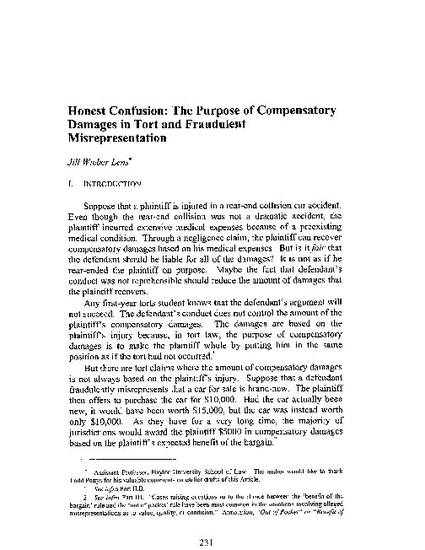
Article
Honest Confusion: The Purpose of Compensatory Damages in Tort and Fraudulent Misrepresentation
Kansas Law Review
(2011)
Abstract
Tort law achieves its main purpose of compensating injured plaintiffs by awarding compensatory damages, which put the plaintiff in the same place as if the tort had not occurred. The amount of compensatory damages is necessarily connected to the plaintiff’s injury. For a long time, however, courts have broken that connection in fraudulent misrepresentation claims. The majority of courts hear “fraud” and award benefit-of-the-bargain damages, claiming that the plaintiff is not whole unless she receives compensation for the lost expectation allegedly created by the misrepresentation. Sometimes though, these same courts deny the plaintiff this compensation if the defendant’s conduct was not reprehensible or, more commonly, was merely negligent. In this article, I argue that courts cannot continue to award benefit-of-the-bargain based compensatory damages for fraudulent misrepresentation. Tort law cannot tolerate the possibility that the amount of compensatory damages depends on the defendant’s conduct; otherwise, tort law may not fully compensate injured plaintiffs. Courts can continue to award benefit-of-the-bargain damages for fraudulent misrepresentation, but only as punitive damages, which is especially appropriate because the purpose of the damages has always been to punish.
Keywords
- fraudulent misrepresentation,
- punitive damages,
- benefit-of-the-bargain damages
Disciplines
Publication Date
2011
Citation Information
Jill W Lens. "Honest Confusion: The Purpose of Compensatory Damages in Tort and Fraudulent Misrepresentation" Kansas Law Review Vol. 59 (2011) p. 231 Available at: http://works.bepress.com/jill-lens/7/
